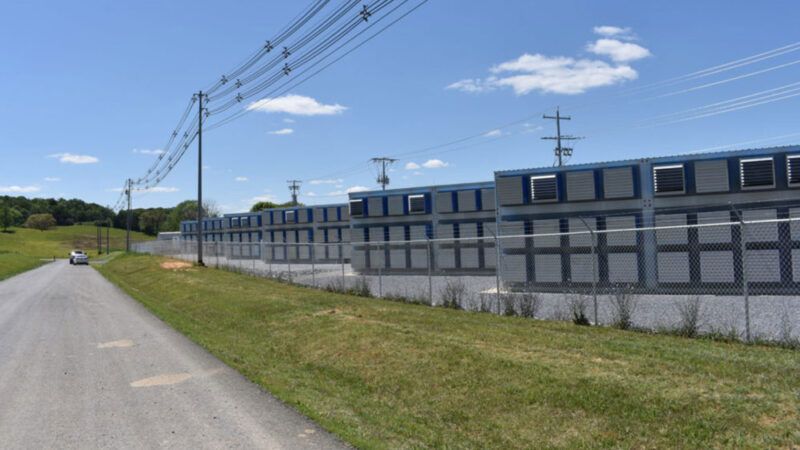Running Bitcoin Miners Out of Town
Trying to sue or zone bitcoin mines out of town is the wrong response to the tradeoffs the industry presents.

Since late 2020, a steady hum has emanated from the 15 large metal containers installed next to an electricity substation in the unincorporated rural community of Limestone in Washington County, Tennessee. The boxes make up a bitcoin "mine." Inside each one, computers work to solve equations that keep bitcoin's decentralized network up and running. In exchange for solving these equations, the computers are rewarded with bitcoin.
That operation is now engaged in a life-or-death struggle with local officials, ostensibly because of noise complaints. The dispute illustrates a nationwide trend that pits bitcoin miners—many of whom are looking for new homes in the U.S. as foreign governments ban their business outright—against regulators who likewise find them intolerable.
Bitcoin-mining computers consume a lot of energy and thus give off a lot of heat, which is blown away by rows and rows of noisy fans. Utility companies with spare power to sell love the high energy consumption. That's why BrightRidge, the company that provides power to Limestone, used cash incentives and cheap rates to induce the bitcoin company Red Dog Technologies to set up its computers next to the utility's substation.
But noise generated by the operation was a problem for neighboring residents. They took their complaints to Washington County officials, who sued BrightRidge in November 2021. While the county commission had approved construction of a "blockchain data center" the year before, the lawsuit said, it had not approved a "Bitcoin blockchain verification facility."
One of the noise complaints about the Limestone bitcoin mine was not actually a noise complaint. Rather, the county objected to Red Dog not getting permits for sound barriers it was also urging the company to put up. Washington County is seeking to close down the mine.
Across the country, other local governments are using zoning laws to restrict bitcoin mining. As in Limestone, these conflicts often stem from noise complaints. But the ensuing regulatory interventions frequently attempt to do much more than mitigate noise.
Complaints about noise brought Project Spokane's bitcoin mine to the attention of policy makers in Missoula County, Montana, in 2017. Soon after beginning their investigation, county officials announced that they wanted to restrict the company's energy use. They estimated that Project Spokane's mine was consuming up to a third of the county's electricity output, thereby undermining a locally set goal of net-zero carbon emissions by 2050.
Beginning with a 2019 temporary zoning ordinance, which was made permanent in February 2021, Missoula County imposed several new restrictions on cryptocurrency mines. Mines could be located only in industrial areas and needed special conditional use permits that come with additional noise restrictions.
The most significant requirement in Missoula County's new zoning ordinance is that cryptocurrency mining operations purchase or produce enough renewable energy to offset 100 percent of the energy they consume. That's a significant entry tax on mining operations, especially in Montana, which is a mining hotspot because it has plentiful energy, mainly from hydroelectric dams.
Noise complaints can lead to excessive regulatory responses even when they don't become a backdoor for climate change regulations. When a growing number of bitcoin operations started provoking noise complaints in Plattsburgh, New York, in 2018, the city imposed an 18-month moratorium on new mines and mine expansions.
Trying to sue or zone bitcoin mines out of town is the wrong response to the tradeoffs the industry presents. Voluntary efforts by mining operations to build sound barriers around their properties or switch to quieter cooling methods often can address the negative externalities they create. Unless local governments can find some means of peacefully coexisting with bitcoin miners, they will be stuck fighting them for a long time.
Rent Free is a weekly newsletter from Christian Britschgi on urbanism and the fight for less regulation, more housing, more property rights, and more freedom in America's cities.


Show Comments (49)